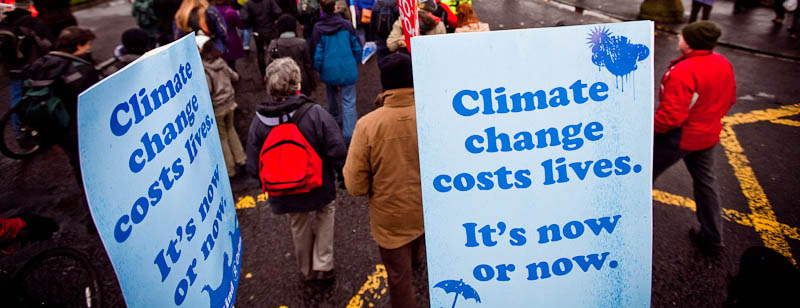Brussels, 4 December 2008 – European leadership on climate change continued to melt away today as EU Environment Ministers meeting in Brussels appeared unable to inject positive momentum into negotiations on Europe’s flagship response to climate change – the climate and energy package.
Environmental campaign groups – Climate Action Network Europe, Friends of the Earth Europe, Greenpeace and WWF – installed giant blocks of ice outside the meeting to symbolise the impacts of climate change, and projected messages onto the Council building urging Ministers to show leadership.
Negotiations between the European Parliament and Council continue, but EU Heads of State and Government have effectively decreed that they alone will decide on the final laws, leaving room for a radical weakening of the legislation at next week’s EU leaders’ summit.
CAN Europe, Friends of the Earth Europe, Greenpeace and WWF expressed their outrage at the blatant disregard for the EU decision-making process in the EU, and took this as a sign that European leaders are preparing the ground to renege on their promises of global climate leadership.
Environmental NGOs call on the European Parliament to bring its political weight to bear on Council and defend its position on the climate legislation. At today’s plenary session, Members of the European Parliament underlined the importance of the positions they voted to support in October, such as the earmarking of auctioning revenues for climate adaptation and mitigation in developing countries, limiting access to offset credits and the need for penalties for those countries that do not achieve their targets.
These positions reflect the two key tests that environmental groups have set for the climate and energy package: whether the EU’s 2020 domestic reduction target is consistent with the challenge to keep global warming below 2 degrees Celsius compared to pre-industrial levels, and whether it will provide sufficient and binding financial support for developing countries to cut their emissions and adapt to the unavoidable impacts of climate change.
At present, there is no consensus between European leaders about whether they will stick to the commitment they made just 20 months ago to cut greenhouse gas emissions by 30% by 2020 in the framework of an international agreement. Even a weaker 20% target is now being undermined, as it will be reached mostly through the purchasing of external carbon credits from other countries.
EU climate “leadership” was further questioned during international climate negotiations in Poznan this week, as the EU appeared unable to commit to deliver financial support to developing countries, in spite of the billions of euros which its Member States should receive from the sales of pollution permits under the EU Emissions Trading Scheme.
On renewable energy, where progress had been adequate so far, the Council is now threatening to backtrack by asking for review clauses which undermine the 20% renewables target and hamper security of investments needed to foster new technologies, which are good for the environment and for job creation.
Climate Action Network Europe, Friends of the Earth Europe, Greenpeace and WWF said: “It is a disgrace that just at a time when the rest of the world – including the US and China – is waking up and starting to act against climate change the EU’s leadership is melting away. There could not be a worse time for the EU to backtrack on the commitments that it made last year. The talk led by some recalcitrant EU countries is now all about competitiveness, protectionism and any creating loophole to avoid meeting climate responsibilities. If the EU does not get its act together, the whole world stands to suffer the consequences.“
***
Time to Lead! is a public campaign coordinated by CAN-Europe, Friends of the Earth Europe, Greenpeace and WWF to keep citizens up-to-date with the discussions on the EU climate package and their implications for average global temperatures. At www.timetolead.eu citizens can take action by asking their leaders to support measures consistent with their commitment to keep global warming below 2°C.



![]()






